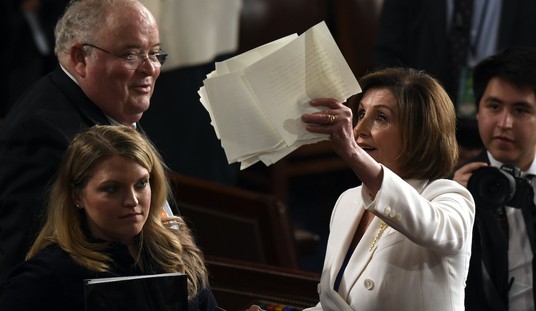While the COVID pandemic foisted countless new rules and regulations on the American people — from all levels of government — in some instances, rules were bent to accommodate that same government. In one particular instance, the rule was bent so far that it rendered the actions of Congress (and President Biden) unconstitutional — so says a federal judge out of Lubbock, Texas.
A Lubbock, Texas, federal judge ruled Tuesday that lawmakers unconstitutionally passed the $1.7 trillion government funding bill in 2022 when they did so under a pandemic-era rule allowing members of the U.S. House of Representatives to vote on the matter by proxy instead of in person.
Texas Attorney General Ken Paxton, a Republican, requested the courts block a provision of the funding bill that gave pregnant workers stronger legal protections.
U.S. District Judge Wesley Hendrix reviewed the request and issued a "limited" ruling on one of two provisions Paxton sought to have blocked.
The Pregnant Workers Fairness Act, enacted in December 2022, requires employers to provide reasonable accommodations for pregnant workers.
In his ruling, Hendrix noted that his injunction is only applicable to state government employees.
Paxton filed a lawsuit last year, arguing the federal spending package was unconstitutionally passed because over half of the House of Representatives were not physically present to provide a quorum, yet they still voted by proxy.
(A quick note here about the framing of the above story: It appears that, in order to properly establish standing to challenge the legislation, Texas asserted that it would be directly - and negatively - impacted by two provisions including in the funding bill — one, involving the PWFA; the other involving the appropriation to the Department of Homeland Security’s Alternatives to Detention Case Management Pilot Program. In issuing his ruling, Judge Hendrix found that the state adequately demonstrated standing as to the PWFA "based on the costs of compliance, litigation, and administrative investigations created by the PWFA, as well as the waiver of Texas’s sovereign immunity." However, he found that the state failed to meet its burden as to the Case Management Pilot Program. In other words, the suit appears to have been aimed at the passage of the gargantuan spending bill without the requisite number of members of Congress present to vote on it, not at depriving pregnant workers of legal protections.)
The ruling (which may be viewed below) is 120 pages long but can be adequately summed up via the court's opening paragraph (emphasis mine):
For over 235 years, Congress understood the Constitution’s Quorum Clause to require a majority of members of the House or Senate to be physically present to constitute the necessary quorum to pass legislation. This rule prevents a minority of members from passing legislation that affects the entire nation. But despite the Constitution’s text and centuries of consistent practice, the House in 2020 created a rule that permitted non-present members to be included in the quorum count and vote by proxy. Pursuant to that novel rule, the House passed a new law included within the Consolidated Appropriations Act of 2023, and that particular provision affects Texas. Like many constitutional challenges, Texas asserts that this provision is unenforceable against it because Congress violated the Constitution in passing the law. In response, the defendants claim, among other things, that this Court has no power to address the issue because it cannot look to extrinsic evidence to question whether a bill became law. But because the Court is interpreting and enforcing the Constitution—rather than second-guessing a vote count—the Court disagrees. The Court concludes that, by including members who were indisputably absent in the quorum count, the Act at issue passed in violation of the Constitution’s Quorum Clause.
Texas Attorney General Ken Paxton's office issued a statement following the decision emphasizing the significance of the ruling:
“Congress acted egregiously by passing the largest spending bill in U.S. history with fewer than half the members of the House bothering to do their jobs, show up, and vote in person,” said Attorney General Paxton. “Former Speaker Nancy Pelosi abused proxy voting under the pretext of COVID-19 to pass this law, then Biden signed it, knowing they violated the Constitution. This was a stunning violation of the rule of law. I am relieved the Court upheld the Constitution.”
The Texas Public Policy Foundation served as co-counsel. “This meticulous, 120-page opinion was written after a full trial on the merits,” said TPPF senior attorney Matt Miller. “The Court correctly concluded that the Consolidated Appropriations Act of 2023 violated the Quorum Clause of the U.S. Constitution because a majority of House members was not physically present when the $1.7 trillion spending bill was passed. Proxy voting is unconstitutional.”
Thus, the bottom line is that, at least according to this ruling and as noted by Matt Miller, "Proxy voting is unconstitutional" — and that $1.7 trillion monstrosity passed in December 2022 is, too. Obviously, there could be significant ramifications to the ruling (which, one suspects, the federal government will appeal). Will be fascinating to watch this unfold.
RELATED:
Republicans Complete Their Betrayal With Omnibus Vote; Here Are the Names
Elon Puts McConnell and Schumer on Blast over Omnibus Bill
Quorum Clause Opinion by Susie Moore on Scribd













Join the conversation as a VIP Member